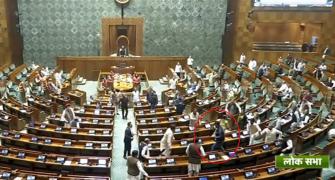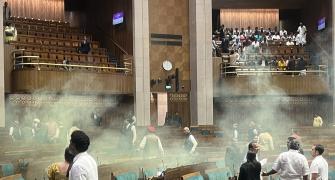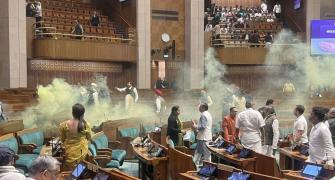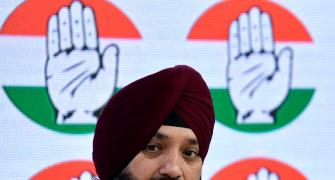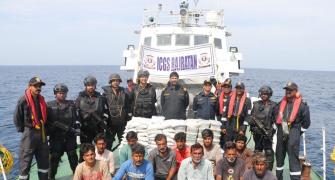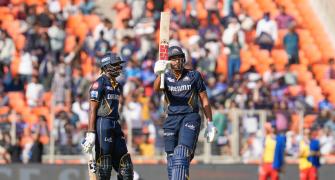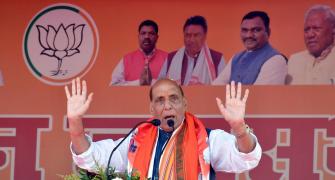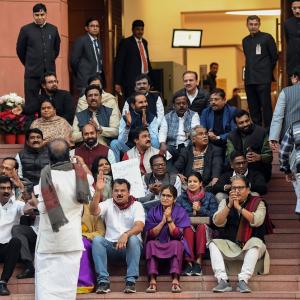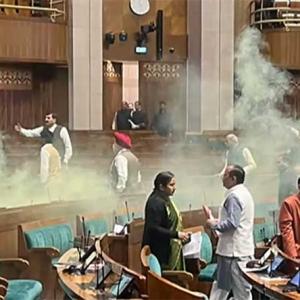Maybe, the need for secrecy may have tied the government's hand from sharing details in Parliament.
Still, it should consider the need of sharing the utmost within any consultative committee, so that relative secrecy is still maintained.
But such a course should involve the prime minister or home minister, as it is much more serious than is being made out to be, argues N Sathiya Moorthy.

By qualifying last week's 'security breach' in Parliament as a 'very serious matter' even if four days after the incident, Prime Minister Narendra D Modi has undoubtedly underlined the gravity of the situation.
Coming as it does after the Delhi police investigation report that the two intruders who had released colour gas on unsuspecting members of the Lok Sabha, that too from the well of the House, the PM's observation in a rare media interview also seems to be saying it all.
First and foremost should be the concern that is otherwise focussed entirely on the security breach.
A mammoth security breach it was, yes, but even more critical was the police statement that the intruders had considered setting themselves ablaze inside Parliament's chambers.
If that had happened, could have MPs rushed to stop them as they could do when they were only letting off non-lethal gas?
What if they had released lethal or toxic gases likewise, if not some kind of an explosive?
According to police reports, the two intruders did not self-immolate themselves only because they could not locate enough gel for smuggling into Parliament House without being detected.
The security breach involved paramilitary agencies trained and equipped to handle such intrusions.
Inside the House, it is Parliament's watch and ward staff who are believed to be exclusively in charge. They are possibly prepared neither mentally, nor physically, to handle such a situation.
Possibly, some of the MPs might feel more comfortable in handling fire-fighting equipment than Parliament's staff.
Less said the better about any or all of them being able to handle an 'explosives situation' as different from an 'explosive situation' in political and debating terms inside the House.
Lok Sabha Speaker Om Birla was right in urging the media not to blow up the incident.
But it is equally simplistic to dismiss it as a non-event of some kind.
The fact is that some disgruntled youth, presumably opposed to the popularly-elected government leadership, had plotted to breach the multi-layered security cordon in one of the most-secured buildings in the country -- and also succeeded in doing it, as if effortlessly.
The Delhi police, which should have questioned the BJP member from Mysuru the moment his name blipped on their screens as the one who had recommended visitor's pass for them, have taken their own time to summon him.
In the meantime, the member has been giving away interviews to whichever section of the media -- language no bar -- on his role/non-role in the matter.
It is a primary lesson in criminal investigations that such witnesses are secured at the first instance. It is done for two main reasons.
One, in the absence of conclusive proof that there was no greater mischief to the intruders' motive and methods, there was the imminent need to ensure that no harm came to the parliamentarian.
Two, there is the theoretical and proven possibilities of witnesses getting confused with their own statements, after responding to multiple questioners on multiple occasions in the past week.
While his stand that he had recommended visitor's pass to the two, on the request of one of them, may stand, there could be variations in details, if and when the police tried to extract those lil' information of great consequence from him.
Now, it would look as if the police interview of the MP is meant to complete a process, whose results seemed to have been pre-determined near-exclusively from the version provided by the arrested men (including one woman, that is).
Prima facie it would now look that there was no conspiracy angle or a foreign hand of some kind, for the Delhi police investigators to probe (further).

The larger question is if it was/is a fit case for the National Investigation Agency, and not just the Delhi police, to probe. This is no reflection on the capabilities and deliveries of the Delhi police.
An NIA probe would prima facie relate to a terror matter. A police investigation implies a common criminal offence, whatever be the depth and width of it.
That could even include offences under the Prevention of Unlawful Activities (Prevention) Act, 1967, otherwise known as UAPA.
After Modi has described the Parliament intrusion of December 13 as a 'very serious matter', does it deserve to upscale the investigation to the NIA's level?
After all, in many inter-religious murder cases, the NIA has been tasked to take over the investigations from the state police elsewhere, to look into a 'terror angle', and more so a 'foreign hand', especially of the Pakistani ISI kind.
Of course, the security breach is unpardonable and so is the callousness of the security agencies and/or personnel tasked in the matter.
It is too much to conceive that this one should happen on the day the nation was paying homage to the valiant eight jawans (and an innocent gardener) who laid down their lives when five terrorists attacked Parliament on December 13, 2001.
Maybe, there was no red alert on December 13 or on December 6, the anniversary of the 1992 Ayodhya demolition, the security agencies had taken it easier this time (too, as in the last couple of years or so).
After all, it was the anniversary of the terror attack on Parliament way back in 2001. It had been preceded by the horrendous 9/11 terror attack in the US and the 1 October car-borne suicide bombing outside the Jammu and Kashmir assembly, nearer home.
What followed was Operation Parakram, India's largest troop mobilisation along the Pakistan border after the 1971 War.
Later, it was explained as testing the Indian Army's new 'cold start' doctrine, but keeping 800,000 troops on war alert for close to a year had its own consequences for their health and morale apart from confusing the men in battle fatigues but without firing a single shot.

Before 2001, and more akin to the current episode was the Emergency era, the incident of the 'Most Wanted' young Jan Sangh member of the Rajya Sabha, Dr Subramanian Swamy, springing up on his feet as if out of nowhere, and raising a point-of-order, when the nation's police force (there was no NIA at the time) was looking for him, all across.
Then minister of state for home, the forgotten Om Mehta, who was on his feet, ducked under his table as he possibly feared that with his both hands in his coat pockets, Dr Swamy was about to throw a grenade at him.
In the melee that followed, Dr Swamy walked out of the House with ease, boarded a waiting car round the corner and escaped, not to be ever to be captured until he could come out after the withdrawal of the Emergency in March 1977.
Of course, Dr Swamy was not an intruder but a duly elected member who was campaigning against the Emergency in the West.
There are no comparisons, yet, unlike Dr Swamy, the two intruders this time and their support teams that playacted the colour-canister act outside Parliament House did not escape.
They did not even seem wanting to escape. And their message was not just to demonstrate the security breach part, which alone has remained in focus.
As it turned out, some social media activists did try early on to convince the rest that it was possibly a dry-run by the security agencies, to test the alertness and efficacy of their systems and personnel. That did not sell.

To the point, the question arises why the government has thus far not taken the two Houses of Parliament, and not stopping even with the Lok Sabha, where the security breach occurred.
In comparison, even the Parliament attack of 2001 did not come this far though the aim of the terrorists and their ISI handlers was precisely as much.
If the terrorists had had their way, the result could well have been horrific, shocking and a national shame.
That it did not go that far should not take away the seriousness attaching to the current intrusion only because no explosive or any kind was involved, and no one was even injured -- whether MPs, visitors or Parliament staff, whether from the watch and ward detail or ministerial staff.
Putting the situation on its head, it can be argued that the intrusion, if especially had taken a more serious turn, could have shamed the nation's pride if a gun or bomb was involved -- and even more, if used.
But the very fact that there was intrusion could mean -- rather, stretched -- to the theoretical possibility of the lives of any of those sitting in the chamber, or en route, could have been harmed.
Of equal concern should be the possibility of any or all of the intruders (including those waiting outside) slipping into even more security-sensitive areas in the building complex, likewise.

Does it entail any MP or any Parliament staff, or his family members, to demand from the government a detailed account of what had gone wrong with the security this time, and if there were any such unreported incidents in the recent past.
Can these people, demand from the government, details of the proposed measures to check against such slip-ups and intrusions, either through a missive or later through the courts?
Another imaginative way is for family members of some of these people going to the every-ready sections of the nation's media.
Maybe, it will help matters this way and otherwise if the government takes both Houses of Parliament into confidence.
In the past, the Nehru government used to take Parliament into confidence on the ongoing China War in 1962 almost on a daily basis.
Maybe, given the sensitivity and the need for secrecy may have tied the government's hand from sharing all details in the open House of the Lok Sabha and Rajya Sabha.
Still, it should consider the need and possibility of sharing the utmost within the four walls of any consultative committee, or of the party leaders who regularly meet at the Business Advisory Committee with the Speaker/Chairman as the chair, so that relative secrecy is still maintained -- as used to be the case in the past.
But such a course should involve the prime minister or home minister, as it is much more serious than is being made out to be, and not to be confined to a statement from the parliamentary affairs minister or circular from the Speaker.
N Sathiya Moorthy, veteran journalist and author, is a Chennai-based policy analyst and political commentator.
Feature Presentation: Aslam Hunani/Rediff.com

